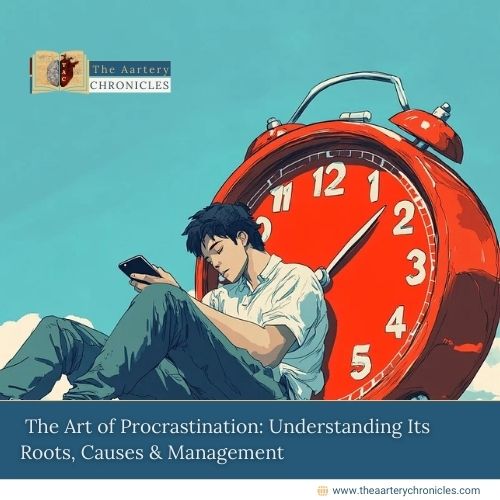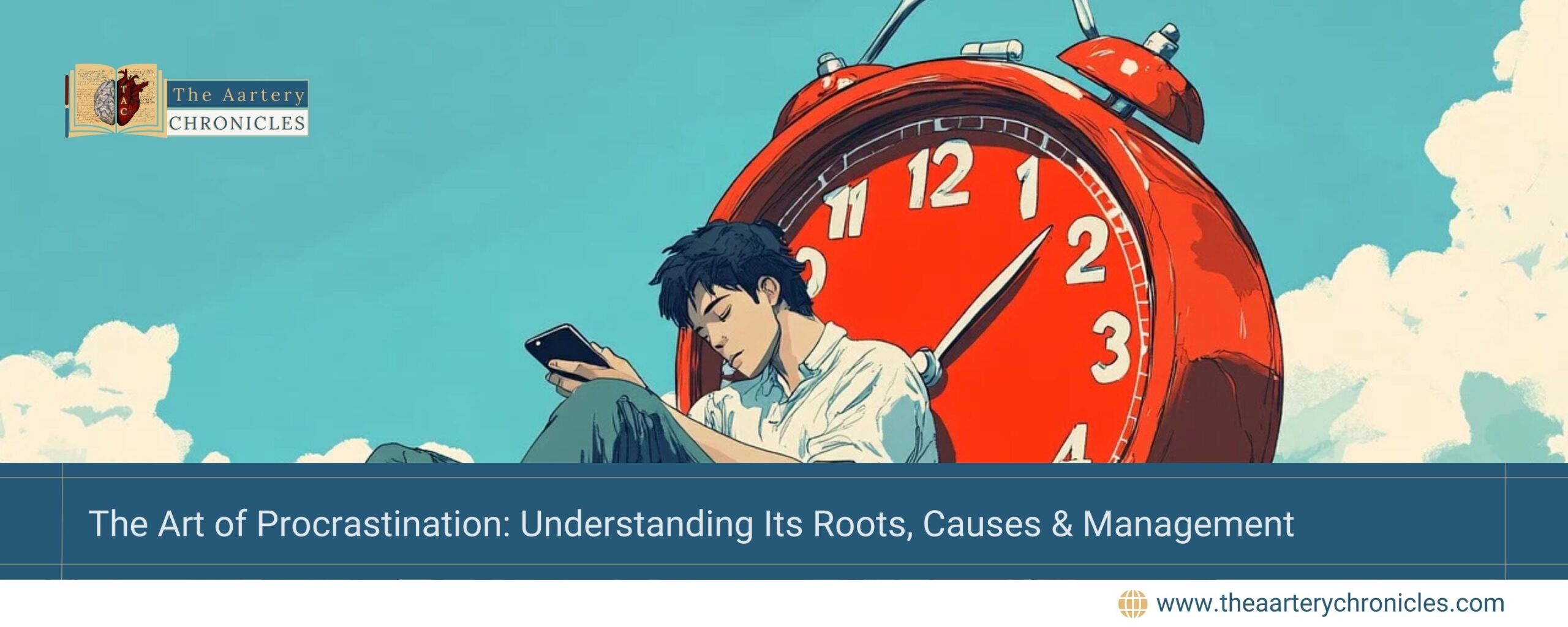

The Art of Procrastination: Understanding Its Roots, Causes & Management
Introduction
Procrastination may seem like a harmless habit, especially when the task at hand feels overwhelming or unpleasant. Yet, this tendency to delay isn’t just a minor inconvenience—it can have a profound impact on our mental and physical well-being. Experts define procrastination as a behavior that brings short-term relief but comes with long-term costs. Research reveals that chronic procrastination affects up to a quarter of adults globally, often leading to increased stress, anxiety, and even physical health issues. In this article, we’ll dive into the psychology behind procrastination, its links to mental health challenges, and how overcoming it can pave the way for a healthier, more fulfilling life.
Types of Procrastination
Procrastination isn’t always about being lazy; it involves various underlying patterns that reflect different personality traits and ways of dealing with tasks. Here are six types of procrastination :
- Perfectionist Procrastinator: This person delays tasks because they fear their work won’t be flawless. They spend excessive time on details, often never finishing the project because it never feels “perfect.”
- Dreamer Procrastinator: Dreamers have big ideas but shy away from the nitty-gritty details. They might envision grand plans but struggle with executing them due to a dislike of practical steps.
- Worrier Procrastinator: Worriers are held back by fear of change or uncertainty. They focus on the “what ifs,” making them avoid risks or steps that might lead them out of their comfort zone.
- Crisis-Maker Procrastinator: Crisis-makers claim they work best under pressure. They delay tasks until the last minute, thriving on the adrenaline of deadlines but often compromising quality and causing stress.
- Defier Procrastinator: In this type the person would resist tasks that feel imposed, deferring or outright ignoring them. Often passive-aggressive, they procrastinate as a way of rebelling against authority or imposed schedules.
- Overdoer Procrastinator: Overdoers take on too much, often focusing on the needs of others at the expense of their own priorities. They end up burnt out, with their own tasks left incomplete.
Psychology of Delay: Why do people procrastinate?
Procrastination, often referred to as the “psychology of delay,” has complex and interconnected causes rooted in various mental health factors. For instance, depression can lead to low energy and motivation, which may, in turn, worsen anxiety and heighten feelings of avoidance toward tasks. This interplay creates a cycle where anxiety increases the aversiveness of tasks, making them feel more daunting or overwhelming.
However, the impact of anxiety on procrastination can vary. Factors like high self-efficacy—the belief in one’s ability to succeed—and mindfulness can help reduce procrastination even when anxiety is present. This shows that our mental approach and skill set play significant roles in how and when procrastination occurs.
People procrastinate for different reasons. For example, one person might delay tasks because of anxiety, while another might procrastinate due to perfectionism or unclear goals. Even within the same person, the reasons for procrastination can vary based on the situation. One day, a person may put off a task due to self-doubt, while on another, they might delay it simply because the task feels too abstract or complex.
Causes of procrastination include
- Perfectionism – fear of not meeting high standards
- Fear of failure – worry about not succeeding
- Fear of criticism– avoiding tasks to escape judgment
- Avoidance– delaying uncomfortable or daunting tasks
- Low self-esteem– doubting one’s abilities and worth
- Self-defeating tendencies – unintentionally setting oneself up for failure
- Depression – low energy and motivation, making tasks feel overwhelming
- Trouble focusing – struggling to concentrate on tasks
- ADHD – difficulties with attention and sustained effort
- Last-minute habit– putting things off until the deadline
- Task aversion – avoiding tasks that seem unpleasant
- Resistance to challenges– hesitating to tackle difficult tasks
- Decision fatigue – struggling to make choices after many decisions
- Difficulty defining goals – lacking clarity on what to achieve
- Disconnect with future self – not seeing the benefit of current actions for future goals.
- Lack of energy – feeling too drained to start or complete tasks
Dual Nature of Procrastination
Procrastination, or delaying tasks, has both positive and negative effects. On the bright side, taking time to reflect can lead to fresh ideas and innovative solutions. Short breaks between tasks allow for recharging, which helps reduce stress and boosts productivity. Sometimes, waiting to gather more information leads to better decision-making.
However, procrastination also has drawbacks. Delays can cause tasks to pile up, creating stress and lowering the quality of work. In business, it can mean missed opportunities, while in schools, it may lead to poor academic performance. Procrastination can also harm relationships, reduce self-esteem, and impact health due to increased stress.
Balancing procrastination wisely, using it to recharge but staying focused on deadlines can help make the best of its benefits while avoiding its downsides.
How can we overcome procrastination?
1. Understand Why You Procrastinate:-
Often, procrastination isn’t about laziness. It’s rooted in fear of failure, of not meeting expectations, or even of success. By identifying the emotional reasons behind it, you can start to address them directly.
2. Break Down Tasks:–
Big tasks can feel overwhelming. Try dividing them into smaller, manageable steps. For example, instead of writing a whole paper, start by just brainstorming ideas or outlining. These “small wins” help build momentum.
3.Set Realistic Goals:-
Focus on what you ‘can’ achieve in the short term. Setting unattainable goals only adds pressure and leads to more procrastination. Aim for a list you can finish, so you feel accomplished rather than stressed.
4. Stay Motivated for Positive Reasons:-
Think about why you want to complete the task beyond just avoiding negative outcomes. Find personal satisfaction in finishing something well rather than fearing poor results. This shift helps make work more meaningful.
5. Create a Supportive Environment:-
Choose your study space wisely. Working in comfortable places (like your bed) or with friends may make it harder to focus. Aim for a quiet spot where you can concentrate.
6. Reward Yourself:-
When you finish a small task, reward yourself. This helps you associate working with positive feelings, making it easier to tackle the next task.
7. Use Flexible Scheduling:-
Rather than a strict schedule, keep a flexible plan. Only note essential tasks and give yourself breaks. This way, you don’t feel trapped by a rigid structure but can still make progress without stress.
8. Get Started with “Swiss Cheese” Approach:-
The “Swiss Cheese” method involves poking “holes” in big tasks by working on them briefly and regularly. Spend just 10 minutes jotting down ideas or reading key points to make a daunting project less overwhelming.
Conclusion
Procrastination is a common struggle, but with the right approach, it’s possible to overcome it. By understanding why we procrastinate, breaking tasks into manageable steps, and setting realistic goals, we can stay motivated and reduce stress. Remember, progress doesn’t have to be perfect. Even small, consistent efforts can lead to lasting change, helping us feel more in control, focused, and satisfied with our achievements.









